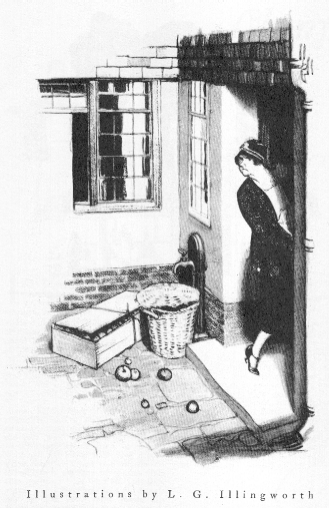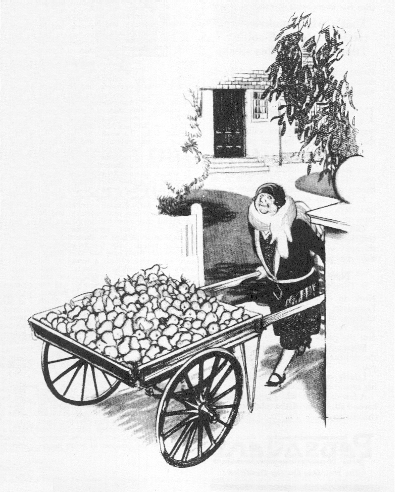


 DESIRABLE RESIDENCES
DESIRABLE RESIDENCES
A delightful comedy
of Robbing Peter—
and Barely Paying
Paul
By E. F. Benson
 OUSES in Tillingham are in much request during the months of August and
September by holiday-makers of the quieter sort, who do not want to stay in large hotels
on esplanades in places where there are piers, to flock to the shore in brilliant
bathing-costumes, to pose for photographers in the certainty of winning prizes as plump
sea-nymphs, to dress for dinner and dance afterwards. But families in search of
tranquillity combined with agreeable pastimes, find Tillingham much to their mind: there
is a golf-links, there are illimitable sands and safe bathing: no treacherous currents
swirl the swimmer out to sea when the tide is ebbing (indeed, the shore is so flat that
the ebb merely leaves him stranded like a star-fish miles away from his clothes): there
are stretches of charming country inland for exploratory picnics, and Tillingham itself is
so full of picturesque corners and crooked chimneys and timbered houses that easels in
August render the streets almost impassable.
OUSES in Tillingham are in much request during the months of August and
September by holiday-makers of the quieter sort, who do not want to stay in large hotels
on esplanades in places where there are piers, to flock to the shore in brilliant
bathing-costumes, to pose for photographers in the certainty of winning prizes as plump
sea-nymphs, to dress for dinner and dance afterwards. But families in search of
tranquillity combined with agreeable pastimes, find Tillingham much to their mind: there
is a golf-links, there are illimitable sands and safe bathing: no treacherous currents
swirl the swimmer out to sea when the tide is ebbing (indeed, the shore is so flat that
the ebb merely leaves him stranded like a star-fish miles away from his clothes): there
are stretches of charming country inland for exploratory picnics, and Tillingham itself is
so full of picturesque corners and crooked chimneys and timbered houses that easels in
August render the streets almost impassable.
The higher social circles in this little town are mainly composed of well-to-do maiden ladies and widows, most of whom, owing to the remunerative demand for holiday residences, live in rather larger houses than they otherwise would and recoup themselves by advantageous letting. Thus towards the middle of July a very lively general post takes place. Those who own the largest houses with gardens, like Miss Elizabeth Mapp, can let them for as much as fifteen guineas a week, and themselves take houses for that period at eight to ten guineas a week, thus collaring the difference and enjoying a change of habitation, which often gives them rich peeps into the private habits of their neighbours. Those who have smaller houses, like Mrs Plaistow, similarly let them for perhaps eight guineas a week and take something at five: the owners of the latter take cottages, and the cottagers go hop-picking. Many householders, of course, go away for these months, but those who remain always let their own houses and are content with something smaller. The system seems to resemble that of those thrifty villagers who earned their living by taking in each others washing, and answers excellently.
Miss Mapp on this morning of early July had received an enquiry from her last year's tenants, as to whether she would let her house to them again on the same terms. They were admirable tenants who brought their own servants, a father who played golf, a mother who wrote letters in the garden, and two daughters with spectacles who steadily sketched their way along the streets of the town. Miss Mapp instantly made up her mind to do so, and had to settle whether she should take a smaller house herself or go away. If she could get Diva Plaistow's house, she thought she would remain here and take her holiday in the winter. Diva was asking eight guineas a week, including garden-produce. The crop on her apple-trees this year was prodigious, and since garden-produce was included, Miss Mapp supposed she would have the right to fill hampers with what she couldn't eat and take them away at the end of her tenancy.
"I shouldn't have to buy an apple all winter," thought Miss Mapp. "And then fifteen guineas a week for eight weeks makes a hundred and twenty guineas, and subtract eight times eight which is sixty-four (I shall try to get it a little cheaper) which leaves—let me see..."
She arrived at the sumptuous remainder by tracing figures with the handle of her teaspoon on the table-cloth, and having written to the admirable tenants to say that she would be happy to let her house again at the same price, hurried to the house-agents to make enquiries. She could, of course, have gone to Diva direct, but it would not be pretty to haggle in person with so old a friend. She put on her most genial smile, and was artful.
"Good morning, Mr Hassall," she said. "A cousin has asked me to enquire about houses in Tillingham for the summer. I think Mrs Plaistow's little house might suit her, but I fancy she wouldn't pay as much as eight guineas a week."
"Very nice house, ma'am. Very good value," said Mr Hassall. "Garden-produce included."
"Yes, but eight guineas is rather high. But perhaps you would tell Mrs Plaistow that you've had an enquiry offering seven. And what about servants?"
"Mrs Plaistow is thinking of getting another house for the summer, and taking her servants with her."
Miss Mapp considered this, still smiling.
"I see. Then would you make enquiries, and let me know as soon as possible ? I am going home at once. Good morning. What a lovely day!"
This question about servants was, like all Miss Mapp's manoeuvres, much to the point. If Diva was leaving servants, her plan was to pick a quarrel with her cook without delay, and give her a month's warning, which would bring her to the beginning of August. But there was no need for that now.
Miss Mapp stepped out of the office into the hot sunshine, and failed to observe Diva, round and red, trundling up the street behind her. But Diva, whose eyes were gimlets, saw Miss Mapp and where she came from, and popping in to see whether there were any enquiries for her house, heard from Mr Hassall that he had just received one, offering seven guineas a week. Such evidence was naturally conclusive, and she had not the smallest doubt that this nameless tenant was Miss Mapp herself. Mr Hassall allowed that the enquiry had been made by Miss Mapp on behalf of a cousin, and Diva laughed in a shrill and scornful manner. She no more believed in the cousin than she believed in the man in the moon, and it was like Elizabeth—too sadly like her, in fact—to attempt to haggle behind her back. She also drew the inference that Elizabeth had received an offer for her house, and already rolling in prospective riches, wanted to roll a little more.
"Kindly ring Miss Mapp up at once," she said, "for I saw her going up the street towards her house, and say that I am asking eight guineas a week, and will not take less. I should like a definite answer at once, and I'll wait."
The telephone bell saluted Miss Mapp's ears as she entered her own door, and the ultimatum was delivered. It was tiresome to have used the cousinly subterfuge and have got nothing by it, but the difference between even eight guineas a week and fifteen was quite pleasant. So she accepted these terms, and since it would soon be obvious that she was her own cousin, she admitted the fact at once. Diva was so pleased to have seen through the transparent and abject trick so instantaneously, that, full of self-satisfaction at her own acuteness, she bore poor Elizabeth no grudge whatever. She only sighed to think how like Elizabeth that was, and having thus secured a very decent let, inspected a smaller house belonging to Mrs Tropp which would suit her very well, and obtained it, for the period during which she had let her own, at four guineas a week.
Some fortnight later, Miss Mapp was returning from an afternoon bridge-party at Diva's. She had won every rubber, which was satisfactory, and had caught Diva revoking beyond all chance of wriggling out of it, which made a sort of riches in the mind of much vaster value than that of the actual penalty. But it was annoying only to have been playing those new stakes of fourpence halfpenny a hundred. This singular sum was the result of compromise: the wilder and wealthier ladies of Tillingham liked playing for sixpence a hundred, but those of more moderate means stuck out for threepence. Diva who hardly ever won a rubber at all was one of these. She said she played bridge to amuse herself and not to make money. Miss Mapp had acidly replied, "That's lucky, darling." But that was smoothed over, and this compromise had been arrived at. It worked quite well, and was a convenient way of getting rid of coppers if you lost, and the only difficulty was when there happened to be a difference of fifty or a hundred and fifty between the scores.
"If a hundred is fourpence halfpenny," said Miss Mapp, "and fifty is half a hundred, which I think you'll grant, fifty is twopence farthing." ...So after that, they all brought one or two farthings with them.
Still, even at these new and paltry stakes, Miss Mapp's bag this evening jingled pleasantly as she stepped homewards. But one thing rather troubled her: it was like a thunder-cloud muttering on the horizon of an otherwise sunny sky. For she had heard no more from the admirable tenants: there had just been the enquiry whether she was thinking of letting, and then a silence which by degrees grew ominous. She wondered whether she had acted with more precipitation than prudence in committing herself to take Diva's house, before she actually let her own, and no sooner had she reached home than she became unpleasantly convinced that she had. The evening post had come in, and there was a letter from That Woman who had written so many in the garden, to say that a more bracing climate had been recommended for her husband, and that therefore with many regrets...
It was a staggering moment. Instead of raking in a balance of seven guineas a week, she would possibly be paying out eight. July was slipping away, so the pessimistic Mr Hassall reminded her when she saw him next morning, and he was afraid that most holiday-makers had already made their arrangements. It would be wise perhaps to abate the price she was asking. By the twentieth of July, anybody could have had Miss Mapp's house for twelve guineas a week: by the twenty-fourth, which ironically enough happened to be her birthday, for ten. But still there was no one who had the sense to secure so wonderful a bargain. It looked, in fact, as if the Nemesis which has an eye to the violation of economic problems, had awakened to the fact that the ladies of Tillingham took in each other's washing (or rather took each other's houses) and scored all round. And Nemesis, by way of being funny, did something further.
On July the thirtieth, Miss Mapp's most desirable residence, with garden and the enjoyment of garden-produce, could be had, throughout August and September, for the derisory sum of eight guineas a week. On that very day two children in the cottage which Mrs Tropp (Diva's lessor) had taken for herself developed mumps. A phobia about microbes was Mrs Tropp's most powerful characteristic, and with the prospect of being houseless for two months (for she would sooner have had mumps straight away than be afraid of catching them) she came in great distress to Diva, with the offer to take her own house back again at the increased rental of five guineas a week. Besides, she added, to turn two swollen children out into the hop-fields was tantamount to manslaughter. Upon which, to Mrs Tropp's pained surprise, Diva burst out into a fit of giggles. When she recovered, she accepted Mrs Tropp's proposal.
"So right," she said, "we couldn't bear to have manslaughter on our consciences. Oh, dear me, how it hurts to laugh. Poor Elizabeth!"
Diva, still hurting very much, whirled away to Mr Hassall's.
"A cousin of mine," she said, "is looking out for a house at Tillingham for August and September. Miss Mapp's, I think, would suit her, but seven guineas a week, I feel sure, is the utmost she would pay. I should like a definite answer at once, and I'll wait. Why, if I didn't use exactly those words to you, Mr Hassall, when last you telephoned to Miss Mapp for me! I won't give my name at present—— Just an offer."
Miss Mapp was in the depths of depression that afternoon when the telephone bell summoned her. She had practically determined to stay in her own spacious and comfortable house for the next two months, since it was of quite a different class to Diva's, but the thought of paying out eight guineas a week for a miserable little habitation (in spite of the apple-trees) in which she would never set foot gnawed at her very vitals. Of course with the produce of her own garden and Diva's, she would have any amount of vegetables, and with the entire crop of Diva's apples added to her own cooking-pears (never had there been such a yield) she would do well in the way of fruit for the winter, but at a staggering price. ... Then the telephone bell rang and with a sob of relief she accepted the offer it brought her. She hurried to Mr Hassall's to confirm it and sign the lease. When she knew that the applicant was Diva, and divined beyond doubt that Diva's cousin was Diva too, she moistened her lips once or twice, but otherwise showed no loss of self-control.
So for two months these ladies stayed in each other's houses. Mrs Plaistow's letters were addressed to "Care of Miss Mapp," and Miss Mapp's letters to "Care of Mrs Plaistow." Every week Diva received a cheque for one guinea from her tenant (which was the balance due) and another from Mrs Tropp, and immensely enjoyed living in quite the best house in Tillingham. She gave several parties there, to all of which she invited Elizabeth who with equal regularity regretfully declined them on the grounds that in the poky little house in which she found herself it was impossible to return hospitalities. ... It may be added that on the happy day on which Miss Mapp got back to her own spaciousness, several large hampers of apples were smuggled in through the back door. But Diva had had a similar inspiration, and, scorning concealment, took away with her a hand-cart piled high with cooking-pears.


